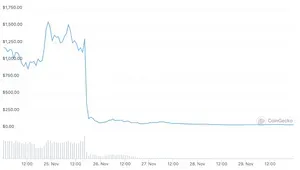Hackers steal about $200 million from BitMart
BitMart, "the most trusted cryptocurrency trading platform", experienced a major breach in which attackers stole approximately $200 million of various cryptocurrencies. The CEO attributed the exploit to a stolen private key, and promised to compensate users who were impacted.
Wikipedia founder Jimmy Wales angers some in the Wikimedia community by announcing he will be auctioning off an NFT representing the first ever edit
Wales announced he would be auctioning an NFT of a website representing the first edit to Wikipedia. This was not taken well by some in the Wikimedia communities — some felt he was misusing Wikipedia to advertise a commercial opportunity for himself that benefits the Wikimedia movement in no way, others felt that NFTs and the artificial scarcity intrinsic to the idea are antithetical to the Wikimedia ideology. Wales is also auctioning off a strawberry-colored iMac (pictured) he used to work on the site, and most people seem to agree that is pretty cool. The NFT ultimately sold for $750,000; the iMac went for $187,500.
SEC charges individual with two fraudulent crypto schemes
The SEC charged Latvian citizen Ivars Auzins with investment schemes he created using fake names and businesses. He allegedly created a fraudulent ICO for a coin that would back "Denaro", what he said was a debit card-like cryptocurrency wallet, but which never actually existed nor had a partnership with a credit card issuer as he claimed. In his second scheme, Auzins allegedly offered unregistered securities of Innovamine, which promised to mine cryptocurrencies on behalf of investors and give them a payout. According to the SEC, Auzins misappropriated nearly all assets he raised through his frauds — at least $7 million.
- "SEC Charges Latvian Citizen With Digital Asset Fraud", U.S. Securities and Exchange Commission
CODEX, a decentralized publishing platform, aims to artificially constrain access to books
A platform called "CODEX" announced that they intend to "upgrade the digital book market industry to Web3". This, apparently, involves artificially limiting the number of copies of books that can be distributed, using technology that is definitely not just a worse version of DRM.
$120 million is stolen from BadgerDAO
A hacker was able to use a compromised Cloudflare API key to inject malicious code into the BadgerDAO platform via Cloudflare Workers. They then siphoned currency of various kinds, equivalent to approximately $120 million, out of user accounts over approximately two weeks before being discovered.
NFT collecter friesframe has a Bored Ape and several other valuable NFTs stolen
Although friesframe had transferred some of his valuable NFTs to cold storage (a crypto wallet not connected to the Internet), he had been waiting for gas fees to come down before transferring more. In that period, his hot wallet was hacked, and a Bored Ape NFT and several others were stolen.
$31 million stolen from MonoX in smart contract bug
A hacker stole $31 million from the liquidity pool provider MonoX by exploiting a bug in their smart contract software that allowed them to exchange a token for itself and artificially inflate the price. MonoX took the classic approach of those burned by crypto issues, and tried to get the cash back by... asking nicely.
A project called "Unvaxxed Sperm" combines COVID-19 misinformation and memecoins
Developers launched a memecoin called "Unvaxxed Sperm", hoping to make a buck while also recruiting for their anti-vaccine group. The name is based on the belief that in the future, sperm (and eggs) from unvaccinated individuals will have enormous monetary value, which is based on the false belief that COVID-19 vaccines render people infertile. The group also promised to make a "pureblood" version of Tinder for the unvaccinated, and create a DAO to allow investors to crowdsource decisions on which anti-vaccine groups and individuals are worthy of their donations.
Either a rugpull or massive communication failure ends in disaster for most holders of SnowdogDAO's token
SnowdogDAO creators say they didn't rugpull, but that the coin plummeting over 90% was a "game-theory experiment" that went wrong. The project was intended to only last for eight days, and when the developers began the planned buyback of SDOG tokens, value crashed. The developers never made it clear to the community that only 7% of tokens could be sold above market price before the buyback, and hundreds of people lost most of their funds. Three addresses made between $3.3 and $10 million from the buyback, and many believe they belong to people who are connected to the development team. In total, about $30 million was lost.
- "Avalanche’s first memecoin SDOG ends in a $30M possible rugpull", Cryptoslate
- "OlympusDAO Fork Snowdog Hit By 90% Crash", Crypto Briefing
Alleged serial scammer launches "MetaWorld" project for at least the third time
Dedric Reid has repeatedly stolen art and promotional material, passing off other projects' work as his own, to promote his "MetaWorld" project — a concept he's been promising (and fundraising for) in various forms since as early as 2016. He's recently relaunched it with a web3 spin, including metaverse ideas and NFTs into its newest form, but it appears to be as much vaporware as it was five years ago. Reid has raised at least $14,000 over the years for this idea which still has no tangible result, though Engadget believes the true amount scammed is probably higher.





